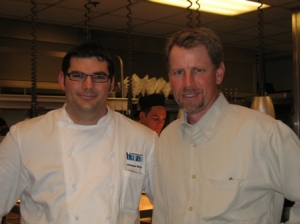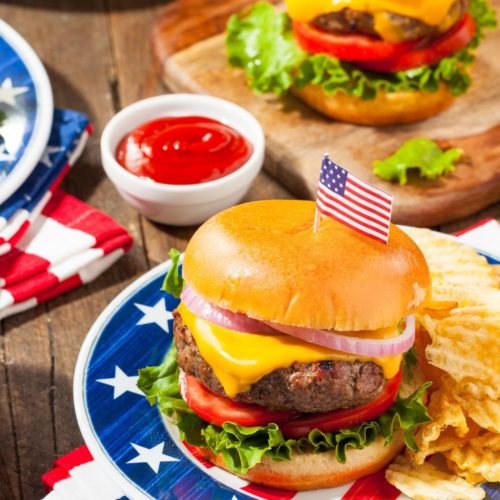
Every family has its “thing.” Some families are bikers. Some are bowlers. Some are gardeners. As for this family…we’re chefs. Every single one of us. That’s a lot of cooks in the kitchen!
When things get unruly, though, and everyone thinks we should make the potatoes their way, Tryg steps in, flaunts his snazzy degree from the Culinary Institute of America, and takes charge. (He’s so bossy.) But, like I said, we’re all chefs and we’ve all got our own go-to tips to make delicious meal after delicious meal. Today, in the spirit of spring and flowers and other good stuff, we’ve decided to share them with you (in no particular order, even though Tryg and his culinary degree thought he should go first). Bon appétit!
- Practice makes perfect. Cook, cook, and cook again. Trial and error is a great teacher!
- Recipes are just suggestions. Get creative!
- Unless you’re baking. Cooking is an art; baking is a science.
- But if you plan to follow a recipe, READ THE WHOLE THING IN ADVANCE. Every step. All the fine print. Getting halfway through and then finding out something was supposed to marinate for eight hours is never fun.
 Prep your ingredients in advance. Chop that onion, collect those spices, and have everything close to hand before you start actually cooking. Practicing mise en place, which is French for “putting everything in place,” will save you time and stress in the long run.
Prep your ingredients in advance. Chop that onion, collect those spices, and have everything close to hand before you start actually cooking. Practicing mise en place, which is French for “putting everything in place,” will save you time and stress in the long run.- Salt matters and all salts are not created equal.
- Let meat rest before you cut into it. If you cut into it too soon, all the juices that make the meat so delicious will escape onto the plate before you can enjoy them.
- Never cook with a wine you wouldn’t drink. (That means Just Say No to the stuff in the vinegar section of the grocery store!)
- Make what you like. Forget trying to cook to impress and make things you enjoy preparing and eating. After all, if you don’t want to eat it, why would anyone else?!
- The difference between a good cook and a great cook is more acid. If your meal needs a flavor boost, add a squeeze of lemon or splash of vinegar right at the end.
- Ditch the store bought salad dressings. Making your own is cheaper, a thousand times more delicious, and has endless flavor possibilities.
- Fresh herbs > dried herbs. Whenever possible, use fresh herbs in your cooking. Don’t want to buy an entire bunch of parsley if you only need a tablespoon? Buy the whole bunch and freeze the leftovers in ice cube trays. Then you’ll have fresh parsley on hand in small quantities for next time.
- Store your ingredients properly. Grocery stores have a vested interest in keeping food fresh for as long as possible. So think about how the ingredients were stored there, and then do that at home. For example, tomatoes should be kept at room temperature to preserve their flavor, and asparagus stalks should be stored upright with the ends in water.
- The only three tools you need: an instant read digital thermometer, a digital scale, and a sharp knife (and maybe a handheld knife sharpener to keep it in peak condition, so, okay, maybe you need FOUR things).
- Whenever you caramelize onions, make a double batch. This goes for rice and grains, too. Having these ingredients already prepped and in the fridge puts you on track for delicious weeknight meals in a hurry.
- When making pasta sauce, add a little of the water you used to cook your pasta to it. Pasta water is full of starch and will add extra body to your sauce.
- Dry your meat. You know those recipes where they tell you to pat your chicken dry with paper towels? It’s for a reason! In the case of a roast chicken, drying the chicken before putting it in the oven means the skin will crisp up better. In the case of other proteins, like a steak, patting it dry before placing it in a hot skillet will allow it to sear rather than steam.

- Save that fat! When you roast a chicken or fry up some bacon, be sure to save the leftover fat. It’s a quick and awesome variation on olive oil and an extra layer of flavor when you go to cook your next meal.
- Oil your veggies before seasoning. Tossing them with oil first means your seasoning will stick better.
- Save your veggie scraps and keep an eye out for sales on things like beef bones, so you can make homemade broth. Freeze your broth in an ice cube tray so you have small amounts readily available for recipes.
- The quality of your meat matters, both to your palate and the planet. Commit to eating meat that has been farmed humanely and sustainably. Your taste buds and Mother Nature will thank you!
These are our top tips—now let’s hear yours! We’re a family of self-taught chefs (except you, Tryg, we KNOW you have a degree) and we’re always interested in learning new tips and techniques. Share them in the comments below and in the meantime, happy cooking!







